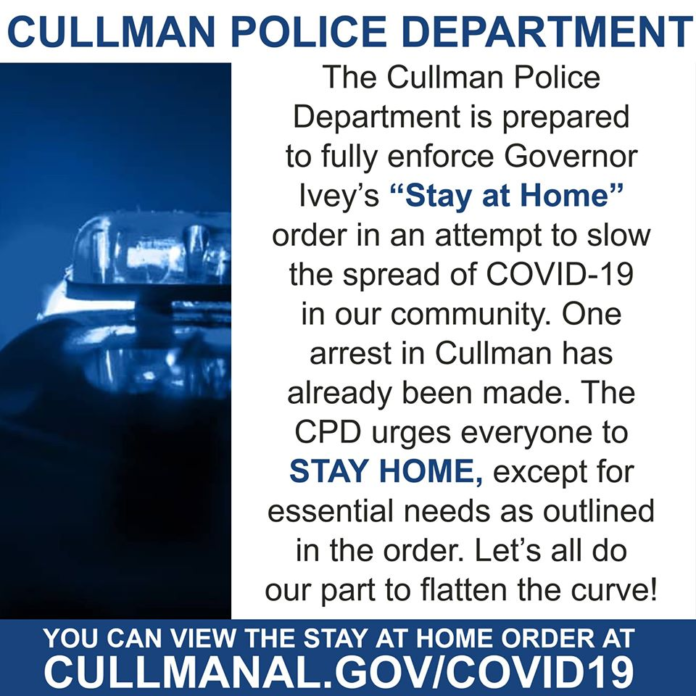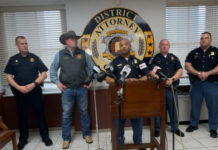CULLMAN, Ala. – After Gov. Kay Ivey and State Health Officer Dr. Scott Harris issued a statewide “stay-at-home” order March 27, some people immediately began to question the validity of the order, arguing that the U.S. Constitution, Alabama Constitution and/or state law prohibit such orders and their enforcement. The Tribune took a look at pertinent documents of the federal and state governments to see what they actually say.
What is a stay-at-home order?
While certain differences might exist between a “stay-at-home order,” “shelter-in-place order” and a “quarantine,” depending on who is using the terms, the State of Alabama seems to view them as somewhat interchangeable. In an opinion issued about Birmingham’s shelter-in-place order, issued before the state’s stay-at-home order, Alabama Attorney General Steve Marshall cited the state’s quarantine laws and noted that “The Alabama Administrative Code defines ‘quarantine’ as ‘the forced isolation or restriction of free movement of a person or persons to prevent the spread of a notifiable disease or health condition. Quarantine may refer to the restriction of access to or egress from any building, place, property, or appurtenance.’”
U.S. Constitution
The Commerce Clause of the Constitution authorizes Congress to regulate “commerce” between the U.S. and foreign nations, and between states. According to the National Institutes of Health, the clause has often been interpreted by the federal government and federal courts in ways that allow Congress to take action on matters of public health if those matters can impact travel or economic relations between states. Use of the clause for health issues by federal authorities has often been reversed in court, though.
The clause has been successfully used to vest authority to act for the benefit of public health in the Secretary of Health and Human Services. The day-to-day operations of the Secretary’s office are carried out by the Centers for Disease Control and Prevention (CDC).
According to information available from the CDC, the federal government:
- Acts to prevent the entry of communicable diseases into the United States. Quarantine and isolation may be used at U.S. ports of entry.
- Is authorized to take measures to prevent the spread of communicable diseases between states.
- May accept state and local assistance in enforcing federal quarantine.
- May assist state and local authorities in preventing the spread of communicable diseases.
As the line of authority descends to more local levels, and since the Commerce Clause is vague- to say the least- on issues of public health, one of the most important federal level statements is the 10th Amendment to the U.S. Constitution:
The powers not delegated to the United States by the Constitution, nor prohibited by it to the States, are reserved to the States respectively, or to the people.
The Constitution’s vagueness on matters of public health, by default, offers greater authority to individual states in that area.
State authority
According to the CDC, states have authority to “Enforce isolation and quarantine within their borders.” The agency also notes that “Public health authorities at the federal, state, local, and tribal levels may sometimes seek help from police or other law enforcement officers to enforce a public health order.”
Alabama Constitution
Section Seven of the State Constitution provides that “That no person shall be accused or arrested, or detained, except in cases ascertained by law, and according to the form which the same has prescribed; and no person shall be punished but by virtue of a law established and promulgated prior to the offense and legally applied.”
This essentially means that the authority to enforce any regulation, when that enforcement involves the arrest of violators, lies in existing law at the time of the violation.
Existing state law: The Code of Alabama
Ivey has called on the 1955 Alabama Emergency Management Act, which forms Title 31 in the Code of Alabama. The Act allows the declaration of a state of emergency in a variety of conditions including a “state public health emergency,” which it defines as:
“An occurrence or imminent threat of an illness or health condition that does all of the following:
- Is believed to be caused by any of the following:
- Bioterrorism.
- The appearance of a novel or previously controlled or eradicated infectious agent or biological toxin.
- A natural disaster.
- A chemical attack or accidental release.
- A nuclear or radiological attack or accident.
- Poses a high probability of any of the following harms:
- A large number of deaths in the affected population.
- A large number of serious or long-term disabilities in the affected population.
- Widespread exposure to an infectious or toxic agent that poses a significant risk of substantial future harm to a large number of people in the affected population.”
Section 31-9-8 (excerpt)
“The existence of a state of emergency may be proclaimed by the Governor as provided in this subsection or by joint resolution of the Legislature if the Governor in the proclamation or the Legislature in the resolution finds that an attack upon the United States has occurred or is anticipated in the immediate future, or that a natural disaster of major proportions or a public health emergency has occurred or is reasonably anticipated in the immediate future within this state and that the safety and welfare of the inhabitants of this state require an invocation of the provisions of this section. If the state of emergency affects less than the entire state, the Governor or the Legislature shall designate in the proclamation or resolution those counties to which the state of emergency applies. The emergency, whether proclaimed by the Governor or by the Legislature, shall terminate 60 days after the date on which it was proclaimed unless the Governor extends the emergency by proclamation or the Legislature extends the emergency by a joint resolution.”
Section 31-9-14
“The law-enforcing authorities of the state and of the political subdivisions thereof shall enforce the orders, rules, and regulations issued pursuant to this article.”
Section 31-9-15
“A peace officer, when in full and distinctive uniform or displaying a badge or other insignia of authority, may arrest without a warrant any person violating or attempting to violate in such officer’s presence any order, rule, or regulation made pursuant to this article. This authority shall be limited to those rules and regulations which affect the public generally.”
Specific Quarantine laws laid out in Title 22
Section 22-12-4
“The Governor, whenever he deems it necessary, or the State Board of Health, shall proclaim quarantine, and when proclaimed, said Board of Health shall enforce such quarantine under such regulations as may, from time to time, be prescribed.”
Section 22-12-26
“Any legal quarantine officer or guard may, without warrant, arrest a person who attempts to violate a quarantine regulation and carry such person either to a designated place of detention or before an officer having jurisdiction of such offense.”
Conclusion
In this case, the “law of the land,” from the federal level down, does permit the state government to issue stay-at-home, shelter-in-place or quarantine orders in the event of a public health emergency, and does permit local law enforcement agencies to enforce those orders, including the arrest and detention of violators.
For more information on the State Health Order, including restrictions and allowances, see our previous story ww.cullmantribune.com/2020/03/28/state-health-officer-state-health-department-detail-business-closures-gov-ivey-addresses-citizens/.
Copyright 2020 Humble Roots, LLC. All Rights Reserved.






























